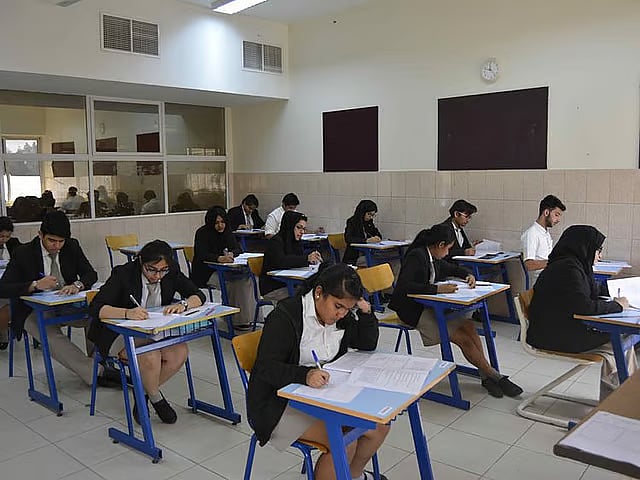Public and private schools across the UAE have outlined 10 key educational regulations that students must adhere to in order to complete their exams in a fair and transparent environment that reflects their true academic performance.
Also Read
UAE issues anti-cheating rules: zero marks, 12-point deduction for students and Dh200,000 fines for school staffMinistry of Education approves first-term final exam schedule for UAE schoolsUAE schools launch campaigns to combat bullyingIntensive exam prep to begin as UAE schools reopen after mid-term breakExams from November 20 to 28 under strict supervision
Public and private schools will conduct end-of-term exams for the first semester from November 20 to 28, under tight procedures designed to prevent cheating, in accordance with the UAE’s official assessment and behavior policies. These measures aim to ensure that exams are conducted calmly and fairly, safeguarding students’ interests.
Schools have circulated official notices to parents detailing the exam regulations and emphasizing the need for full compliance to avoid penalties that could include exam cancellation. The rules stipulate:
Punctual attendance at exams.
No discussions or talking inside exam halls.
Following all exam-specific instructions.
Sitting only in assigned seats.
Avoiding gestures, signals, or communication with other students.
Not bringing prohibited electronic devices.
No sharing of exam questions or papers by any manual or electronic means.
No cheating — whether traditional (e.g., paper notes) or digital (e.g., ChatGPT).
No entry with books, study notes, or storage devices.
No arguments or verbal abuse towards invigilators or peers.
Documenting and reporting violations
Schools confirmed that any exam violations will be recorded and reported immediately. If a case of cheating or misconduct is detected, it will be documented with supporting evidence such as notes, photos, or other records. The student involved will be escorted to a separate supervised room to avoid disrupting others.
Strict penalties for misconduct
Students found guilty of misconduct during exams will face disciplinary action under school behavior regulations. Any person—other than a student—who commits misconduct during exams will be subject to penalties under Federal Decree Law No. (33) on combating cheating and exam violations.
Teachers in both public and private schools emphasized ongoing efforts to educate students on academic integrity and the importance of honesty, while ensuring appropriate exam environments—adequate lighting, properly spaced seating, and trained invigilators capable of identifying potential cheating.
School administrations also announced technical restrictions, including blocking access to ChatGPT and social media platforms, and inspecting students’ devices to ensure no use of VPNs or software designed to bypass these restrictions.
Ban on smartwatches and mobile phones
Schools reaffirmed a strict ban on mobile phones, smartwatches, and all electronic devices inside exam halls to ensure fairness and concentration. These devices could be used to search for answers or communicate with others. Students are also prohibited from exchanging stationery or tools during exams to maintain order and prevent traditional cheating attempts.
Violations considered exam misconduct
Five actions are classified as exam system violations if committed before, during, or after exams, inside or outside exam halls:
Causing disturbance or disorder.
Damaging exam papers intentionally.
Cheating or assisting others in any form.
Impersonating another student during exams.
Forging school documents.
Anti-cheating measures in schools
Efforts to combat cheating combine preventive measures and disciplinary actions designed to uphold fairness and integrity.
Preventive measures: Ban on electronic devices: No phones, smartwatches, or similar gadgets allowed in exam rooms.
Website blocking: Restricting access to social media and AI tools like ChatGPT.
Device inspection: Checking for VPN or bypass applications.
Covering answer sheets: Encouraging students to shield their papers.
No sharing of materials: Prohibiting the exchange of pens, rulers, and similar items.
Disciplinary actions:
Strict penalties: Clearly defined consequences for cheating.
Grade deduction or zero score: Reducing marks or awarding a zero in the subject.
Exam invalidation: In severe cases, canceling the exam result.
Official reports: Filing detailed cheating reports for legal and administrative review.
Behavioral rehabilitation: Enrolling offenders in a behavior correction program.
Mandatory reporting: Schools must report all violations to education authorities.
Role of schools and parents
Parental engagement: Involving parents through regular meetings and parent councils to address cheating behavior.
Guidance counseling: Requiring students involved in cheating to work with counselors to improve their behavior.
Raising awareness: Promoting values of honesty, integrity, and ethical conduct among students.
Sign up for the Daily Briefing
Get the latest news and updates straight to your inbox
Network Links
GN StoreDownload our app
© Al Nisr Publishing LLC 2026. All rights reserved.
